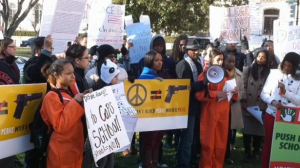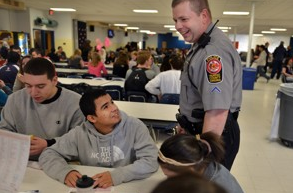News & Announcements
- Details
- Written by Joshua Wachtel
 Not long ago I was driving in my car and tuned to my local free radio station. I was pleasantly surprised to find myself listening to an hour-long interview about restorative justice with Danielle of New York City based Rockdove Collective. She is very articulate about restorative justice and also discusses some unique ways that restorative justice can be used to support victims of domestic violence. In place of a Sunday video, this week I'm posting the full audio interview.
Not long ago I was driving in my car and tuned to my local free radio station. I was pleasantly surprised to find myself listening to an hour-long interview about restorative justice with Danielle of New York City based Rockdove Collective. She is very articulate about restorative justice and also discusses some unique ways that restorative justice can be used to support victims of domestic violence. In place of a Sunday video, this week I'm posting the full audio interview.
[audio:http://www.madnessradio.net/audio/download/126/MadnessRadio-2007-03-14RestorativeJustice.mp3|titles=Danielle of Rockdove Collective speaking about restorative justice on Madness Radio]
Download here.
This program from Madness Radio with Will Hall is licensed Creative Commons BY-NC-ND – original web page here.
- Details
- Written by Joshua Wachtel
From an article from Edmonton, Canada about how restorative practices are being applied in a middle school:
When Spencer Cummings' peers at school started saying "stupid things" and insulting him, the 13-year-old sat in a circle alongside those students and the school principal to explain how the situation made him feel.
It gave Spencer the chance to articulate his hurt feelings and help resolve the conflict. He said the method was more empowering than the traditional approach of having the principal or teacher handle the discipline.
"I could explain to the kids why I thought that was wrong, even though they might know it was wrong," said Spencer, a student at Fultonvale Elementary Junior High School in Sherwood Park.
"Then we talked about what we could do in the future to resolve this issue. I didn't have many issues at all after that....
"I felt really good about it. We just talked out our issues as a group and I didn't find it intimidating because we were just really calm about it. We talked to each other about how we really felt about it and what we thought we all could have done better."
Read "Students form sharing circles rather than play blame game" by Andrea Sands for the Edmonton Journal.
- Details
- Written by Joshua Wachtel
 Photo by Elliott Francis for WAMU
Photo by Elliott Francis for WAMU
There's a great new web site resource created by the Advancement Project called Ending the Schoolhouse to Jailhouse Track. This phrase is synonymous to the more familiar one, "ending the school-to-prison pipeline." The site includes news, a map of the movement, success stories, an invitation to attend "action camp," a link to "submit your story" and much more, including links for ways parents, students, teachers, law enforcement and activists can get involved.
Click here to visit the web site.
In a related bit of news from WAMU (American University public radio in Washington, D.C.) states, "A coalition of students is demanding that Congress reject legislation that promotes the use of police or armed guards in public schools." One student is quoted as saying, "We know already in our communities that police don't make our schools any safer."
A transcript of the piece and a link to listen to the radio report can be found here.
- Details
- Written by Joshua Wachtel
Les Davey, director of IIRP UK & Ireland, emailed an update on the 1-day conference being planned for June 20, 2013 in Salford, Manchester, UK. He writes, "The programme is coming together nicely with both national and international plenaries plus a wide choice of workshops across Justice, Communities, Education and Care."
- Details
- Written by Joshua Wachtel
According to Nirvi Shah, writing for EdWeek:
A panel of school safety, climate, and security experts quizzed by a House committee today largely agreed that schools need more counselors, better communication between adults on campus and students, and additional, thoughtful emergency planning.
One thing they don't need, according to the experts: Teachers carrying guns to class.
Shah quotes David Osher of the American Institutes for Research, who she calls a "school climate guru": "The real challenge in schools is not the low-incidence and very traumatic events we want to prevent. It's low-level aggression that takes place persistently."
Shah points out that "Combating that, and ultimately preventing more serious events, begins with forming trusting relationships between students and adults, especially school resource officers and counselors." [emphasis added]
The complete article can be found here.
- Details
- Written by Joshua Wachtel
On Februrary 6 there was an interesting bit of news from the Restorative Justice Council, which notes a recommendation in a recent U.K. government report that restorative justice presents a "rich avenue for improving the handling of police complaints." The report also recommends, "The Commission should set out best practice protocols for their use in appropriate cases and the use of informal or local resolution systems should be independently monitored to ensure that it is not used inappropriately in relation to conduct that would justify criminal or disciplinary proceedings."
- Details
- Written by Joshua Wachtel
IIRP, which is based in Bethlehem, Pennsylvania, has been working with the local Bethlehem Area School District the past two years to implement restorative practices at two large high schools and at other schools in the district. Lehigh Valley PBS TV (Public Broadcasting System) included a five minute segment about the implementation in a recent 30-minute program called Tempo, which focused on the question of bullying in schools. The segment includes interviews with IIRP instructor Mary Jo Hebling and examples of how restorative circles are being used by teachers in classes.
- Details
- Written by Joshua Wachtel
On her blog this weekend, Lorenn Walker posted a piece about what she sees as the significance of the restorative justice conference used at the pre-sentencing phase of the Ann Grosmaire murder case. Here's an excerpt from her piece, with links preserved:
[Paul] Tullis’s article [in the New York Times Magazine] made an important contribution by describing how restorative justice can be used at the plea agreement stage of a murder case, by “vividly tell[ing] the story from the perspectives of the different parties that took part in the process” as pointed out by Hadar Aviram, law professor at the University of California Hastings College of Law in San Francisco.
- Details
- Written by Joshua Wachtel
This video is from American Humane, which formerly housed the National Center on Family Group Decision Making, now a part of the Kempe Center. The video describes the Family Group Decision Making process, a restorative practice for engaging families to find their own solutions to problems.
- Details
- Written by Joshua Wachtel
Denver, Colorado, is in the national news this week. At a time when some are calling to beef up police security in schools, Denver is limiting by contractual agreement the role of police in schools, and requiring training for those police who will remain so that they do not wind up criminalizing more students. The approach calls for restorative justice. The Washington Post reports:
As communities across the country beef up police presence in schools, Denver may become a national counterpoint Tuesday, when officials plan to sign an agreement to limit the role of law enforcement at the city’s schools — a move that could mean fewer students will face arrest or citation for disciplinary infractions.

Restorative Works Year in Review 2024 (PDF)
All our donors are acknowledged annually in Restorative Works.

